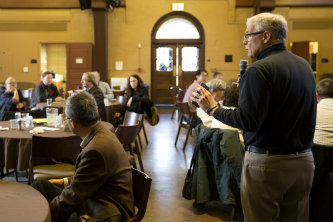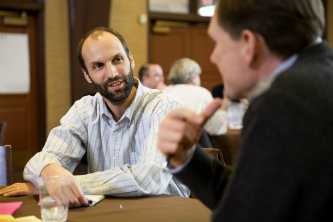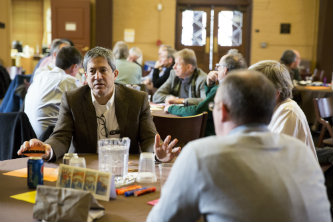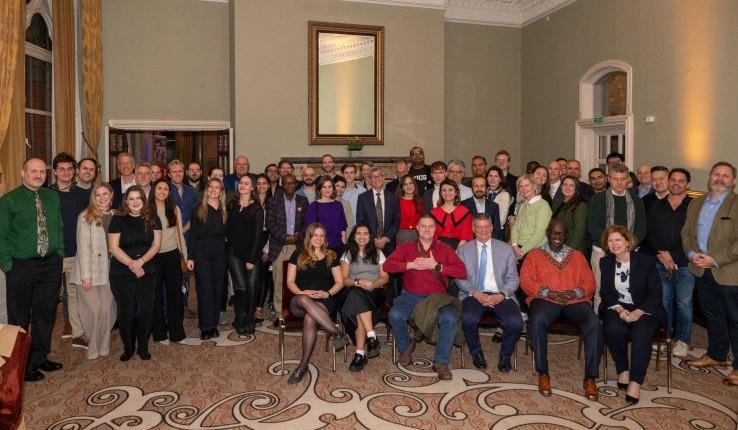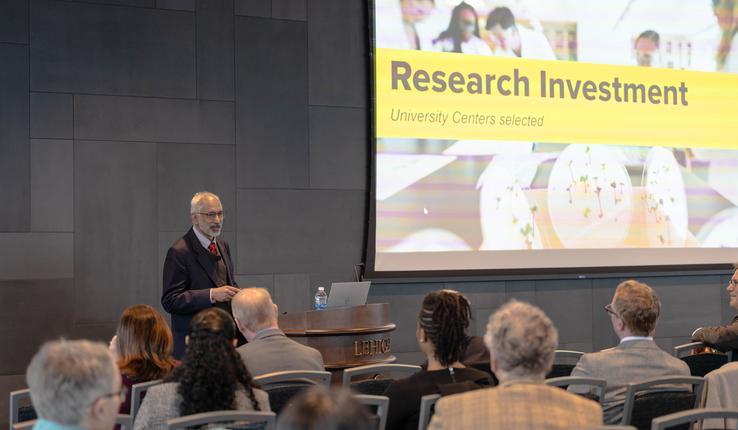World Café: A few big ideas for Lehigh
Provost Pat Farrell helps facilitate one of the World Cafés, which is helping to generate "big ideas" for Lehigh. Video by Stephanie Veto.
Lehigh Provost Pat Farrell stood before 100 or so employees gathered around tables in a second-floor room of Linderman Library and made his pitch: “Help us think of big ideas, ambitious ideas for Lehigh.”
With the Lehigh Board of Trustees investing $250 million in Lehigh’s future, Farrell said, the university was inviting faculty and staff from across the campus to brainstorm ideas around big directions they think Lehigh should consider taking in the next decade. Then, as ideas and themes emerge, he said, university leaders would “test” those ideas at future meetings with potential donors and alumni.
“We want to make sure we’re making really sound investments,” said Farrell, laying out the format of Lehigh’s World Café, as the gathering, and earlier ones, were called.
And so, for the next hour on this March afternoon, as participants lunched over ham and turkey sandwiches, the ideas flowed freely in several rounds of conversations—for a new college, new programs, new initiatives.
Table hosts jotted down the ideas on large swaths of paper, then posted them around the room.
“We’ll have to choose carefully from most of the ideas we see,” said Farrell in an earlier interview. “But it’s important to actually try, and I think we will, implement some of these big ideas.”
The World Café gatherings follow President John Simon’s announcement on Founder’s Day 2015 that the Board of Trustees had committed to investing in institutional resources in the areas of teaching, learning, research and student life. Among initiatives, the funds would be used to address aging labs and technical infrastructure and to deepen the university’s commitment to the hallmarks of a Lehigh education, including integration, innovation and entrepreneurship.
“Here’s a chance for people who haven’t had an opportunity…to be part of the conversation,” said Farrell, “to join in and put their own ideas on the table.” Undoubtedly, he said, people will have ideas that Lehigh’s decision-makers wouldn’t think of on their own or wouldn’t have the perspective to get them there. “So the very practical result is, we’re going to get better ideas.”
And for those dreams to come to fruition, he said, the university will need to engage people across the campus early on, in the idea-generating stage. “People hopefully [will] get excited about not just their ideas,” he said, but “other people’s ideas, even the concept of taking on big ideas.”
The World Café model was developed 20 years ago in California. Facilitator George White, professor of educational leadership at Lehigh, likened it to a gathering in a European café, where people sit around a table and have a conversation about a critical core topic. The process, he said, allows people to talk with one another, not at one another.
“It’s a futures-oriented approach,” he said. “The intent is not to talk about what’s not working, or what we’ve done right or wrong in the past. It’s to talk about where an organization, where we, should go in the future.”
On this day, the staff gathering was hosted by the Provost Office, in collaboration with the Employee Relations Advisory Committee.
Participants were asked first to identify “big ideas” that could be done within Lehigh’s existing footprint, involve at least two colleges/divisions and have an impact on the quality of students’ education and/or the university’s research reputation. Then, in the second 20-minute round, participants were to identify “big ideas” outside the university’s existing structures that, if invested in, would enhance Lehigh’s national and international reputation and make a major difference in the world.
“Those questions are designed in such a way so that a group of four to six people talk deeply about that question and share ideas,” White said. “They’re drawing on their papers, they’re thinking, they’re piggybacking off of other people’s ideas.”
The gatherings have few rules: no negative statements, no “but” statements. “We say, yes and,” said White. “We add and grow, and so the process of these questions become iterative and allows for growth of an idea, so that by the time the 20 minutes in the first round is up, one idea is no longer my idea or someone else’s idea, it’s our idea that’s popped out at the table.”
At the staff gathering, the ideas ran the gamut. Among them: a new conference center, a new research center, a monorail, the development of Stabler land as a living laboratory for farm-to-table initiatives, a College of Agriculture, a medical school, an expansion of the College of Education to include undergraduate courses, scholarships for South Side students, a regional health care collaboration, the elimination of tuition for families who earn less than $100,000 annually.
Among the four World Cafés that have been held with faculty and staff, there have been similarities in concepts from table to table and gathering to gathering. Recurring themes include community health care and engaging with the Mountaintop initiative, White said, as well as ways to physically connect the Asa Packer and Mountaintop campuses. One idea that popped up was for a funicular powered by renewable energy, he said, to move people from the lower campus to the upper campus without adding to the university’s carbon footprint.
“The beauty of the World Café is, no idea is a silly idea, no idea is a wrong idea, no idea is a stupid idea,” said White. “An idea can become a kernel for somebody else to build on. By the time we leave, after an hour, that kernel may have grown into a really functional useable idea.”
Faculty have been an important part of the process.
In thinking about what Lehigh should be in the future, those who are here now are the ones who are going to help create that, White said. “And whereas administration tends to come and go, university faculty and staff members typically stay, especially in a place like Lehigh, where it’s such a wonderful place to work. And so I give President Simon great credit for reaching out and requesting the faculty to be more actively involved in these kinds of big picture ideas.”
And what faculty members say, he said, is to break down traditional departmental barriers that can inhibit the university from moving forward. “So these ideas of cross-disciplinary, interdisciplinary, new disciplines, are what really are driving the movement forward."
Suggestions from the World Cafés are being consolidated, given the common themes that have surfaced. A “report-back” meeting will be scheduled this month, in which participants and anyone else interested in the process can attend to hear about what has been proposed.
Farrell said there also will likely be discussion of what might have been missed and what happens next.
“The challenge now is to pick the ones we want to do first, we want to do most, and that we think will have the biggest benefit to us, and we have to define benefit,” Farrell said.
“We still have difficult decisions to make. We’re still not going to be able to do everything we could imagine. But we’re going to be able to do some really big things.”
Videos and photos by Stephanie Veto, who also contributed to the reporting.
Posted on:


